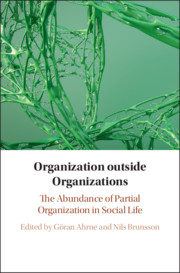Book contents
- Organization outside Organizations
- Organization outside Organizations
- Copyright page
- Contents
- Preface
- Contributors
- Introduction
- Part 1 Rules, Sanctions, Membership
- Part 2 Organization in and around Markets
- Part 3 Networks and Other Social Relationships
- Part 4 Social Movements and Collective Action
- Part 5 The Partial Organization of Formal Organizations
- 17 Partial De-Organizing for Innovation and Strategic Renewal? A Study of an Industrial Innovation Programme
- 18 The Partial Organization of International Relations: International Organizations as Meta-Organizations
- Conclusion
- Index
- References
18 - The Partial Organization of International Relations: International Organizations as Meta-Organizations
from Part 5 - The Partial Organization of Formal Organizations
Published online by Cambridge University Press: 11 July 2019
- Organization outside Organizations
- Organization outside Organizations
- Copyright page
- Contents
- Preface
- Contributors
- Introduction
- Part 1 Rules, Sanctions, Membership
- Part 2 Organization in and around Markets
- Part 3 Networks and Other Social Relationships
- Part 4 Social Movements and Collective Action
- Part 5 The Partial Organization of Formal Organizations
- 17 Partial De-Organizing for Innovation and Strategic Renewal? A Study of an Industrial Innovation Programme
- 18 The Partial Organization of International Relations: International Organizations as Meta-Organizations
- Conclusion
- Index
- References
Summary
In this chapter we argue that the key to an understanding of international governmental organizations (IGOs) is to conceptualize them not as standard forms of organizations with individuals as their members, but as meta-organizations comprising organized actors as members. Meta-organizations are paradoxical constructions: autonomous actors with autonomous actors as members. Organizational elements cannot be considered in isolation in meta-organizations; their combination are key factors; therefore meta-organizations are often partially organized. IGOs are permanently competing for actorhood with their member states and this competition has far-reaching implications for to what extent they can make use of all organizational elements. Using one element may require the avoidance of other elements or certain forms of decision-making. This helps to explain why IGOs have problems achieving co-ordinated organizational action and why they are less powerful actors than standard organizations are. Yet IGOs are strong in other respects. The most important organizational element in IGOs is membership. The strengths of IGOs can be understood in relation to their creation, their expansion, and their long-term influence on their members.
Keywords
- Type
- Chapter
- Information
- Organization outside OrganizationsThe Abundance of Partial Organization in Social Life, pp. 390 - 418Publisher: Cambridge University PressPrint publication year: 2019
References
- 2
- Cited by



